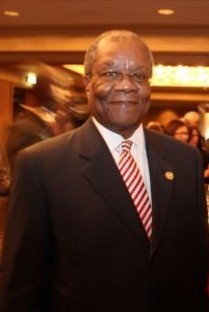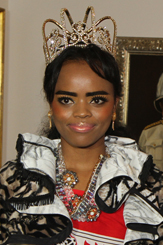
Eswatini, officially the Kingdom of Eswatini and formerly named Swaziland, is a landlocked country in Southern Africa. It is bordered by Mozambique to its northeast and South Africa to its north, west, south, and southeast. At no more than 200 km (120 mi) north to south and 130 km (81 mi) east to west, Eswatini is one of the smallest countries in Africa; despite this, its climate and topography are diverse, ranging from a cool and mountainous highveld to a hot and dry lowveld.

Eswatini is an absolute monarchy with constitutional provisions and Swazi law and Custom. The head of state is the king or Ngwenyama, currently King Mswati III, who ascended to the throne in 1986 after the death of his father King Sobhuza II in 1982 and a period of regency. According to the constitution of Eswatini, the king and Ingwenyama is a symbol of unity and the eternity of the Swazi nation. By tradition, the king reigns along with his mother or a ritual substitute, the Ndlovukati. The former was viewed as the administrative head of state and the latter as a spiritual and national head of state, with real power counterbalancing that of the king, but during the long reign of Sobhuza II the role of the Ndlovukati became more symbolic. The king appoints the prime minister from the legislature and also appoints a minority of legislators to both chambers of Libandla (parliament), with help from an advisory council. The king is allowed by the constitution to appoint some members to parliament for special interests. These special interests are citizens who might have been left out by the electorate during the course of elections or did not enter as candidates. This is done to balance views in parliament. Special interests could be people of gender, race, disability, business community, civic society, scholars, chiefs and so on. The Senate consists of 30 members, of which some are appointed by the king on recommendation of the advisory council and others elected by the lower house. The House of Assembly has 65 seats, of which 55 are occupied by elected representatives from the 55 constituencies around the country, and 10 are appointed by the king on recommendation of the advisory council. The attorney general is the ex-officio member. Elections are held every five years.
The Umbutfo Eswatini Defence Force (UEDF) is the military of the Southern African Kingdom of Eswatini (Swaziland). It is used primarily during domestic protests, with some border and customs duties; the force has never been involved in a foreign conflict. The army has struggled with high rates of HIV infection. Since measures were put in place the rate is dropping.

Until 22 May 2014, the politics of Thailand were conducted within the framework of a constitutional monarchy, whereby the prime minister is the head of government and a hereditary monarch is head of state. The judiciary is independent of the executive and the legislative branches.

Artifacts indicating human activity dating back to the early Stone Age have been found in the Kingdom of Eswatini. The earliest known inhabitants of the region were Khoisan hunter-gatherers. Later, the population became predominantly Nguni during and after the great Bantu migrations. People speaking languages ancestral to the current Sotho and Nguni languages began settling no later than the 11th century. The country now derives its name from a later king named Mswati II. Mswati II was the greatest of the fighting kings of Eswatini, and he greatly extended the area of the country to twice its current size. The people of Eswatini largely belong to a number of clans that can be categorized as Emakhandzambili, Bemdzabu, and Emafikamuva, depending on when and how they settled in Eswatini.

Mswati III is the king of Eswatini and head of the Swazi royal family. He was born in Manzini in the Protectorate of Swaziland to King Sobhuza II and one of his younger wives, Ntfombi Tfwala. He was crowned as Mswati III, Ingwenyama and King of Swaziland, on 25 April 1986 at the age of 18, thus becoming the youngest ruling monarch in the world at that time. Together with his mother, Ntfombi Tfwala, now Queen Mother (Ndlovukati), he rules the country as an absolute monarch. Mswati III is known for his practice of polygamy and currently has 15 wives.

The Communist Party of Nepal is the second largest political party in Nepal. As per the results of recent elections, CPN (UML) stands as the second largest party of Nepal at all levels of government. There have been four prime ministers from the party while the party has led the government five times. CPN (UML) currently serves as the opposition in the Federal Parliament of Nepal and all of the seven provincial assemblies. As of 2021, the party claims to have nearly 600,000 members.

The Parliament of Eswatini is bicameral, consisting of a lower chamber and an upper one. Some of the members of both chambers are elected, while the rest are appointed by the King of Eswatini. Election is by secret ballot in a first-past-the-post system of voting. Members of both chambers serve for five-year terms. All candidates run on a non-partisan basis, as political parties are banned.

The People's United Democratic Movement is the largest opposition party in Eswatini. It is a democratic socialist party. Formed in 1983 at the University of Eswatini, it is led by Mlungisi Makhanya. The Swazi government has been monitoring PUDEMO closely since it launched the Ulibambe Lingashoni campaign, which aims for a "total liberation" of Eswatini, and has recently cracked down heavily on even small manifestations of support for PUDEMO, such as the death in custody of PUDEMO member Sipho Jele, who was arrested for wearing a PUDEMO t-shirt in May 2010.

The House of Assembly of Eswatini is the lower chamber of the country's bicameral Parliament. The Assembly may debate and pass bills.

The Senate of Eswatini is the upper chamber of the country's bicameral Parliament. The Senate may debate or pass a bill, with the exception of a "money bill", which must first be introduced in the lower chamber, the House of Assembly.

Prince Barnabas Sibusiso Dlamini was a Swazi politician who served as Prime Minister of Eswatini, from 1996 to 2003 and again from October 2008 to September 2018.

In Eswatini, an inkhundla is an administrative subdivision smaller than a district but larger than an umphakatsi. There are 55 tinkhundla in Eswatini: 14 in Hhohho District, 11 in Lubombo District, 16 in Manzini District, and 14 in Shishelweni District. According to the constitution of Eswatini, the government for Eswatini is a democratic, participatory, tinkhundla-based system that emphasizes devolution of state power from central government to tinkhundla areas and individual merit as a basis for election or appointment to public office. The system is non-partisan since the constitution does not recognize political parties, although section 25 of the constitution allows for open freedom of assembly and association. Each inkhundla elects one representative to the House of Assembly of Eswatini, the lower chamber of the bicameral parliament (Libandla). The same trend is applied in local government elections. This governing system was designed by King Sobhuza II with the assistance of political scholars and lawyers. It came to effect in 1978 and was adjusted in the early 1990s.

Princess Sikhanyiso Dlamini is a Swazi princess and politician. She is the eldest daughter of King Mswati III of Eswatini, and is the country's current Minister of Information and Communication Technology.

General elections were held in Swaziland on 19–20 September and 18–19 October 2003. Fifty-five independent candidates were elected to the Parliament. Voter turnout was only 18.4% of the 213,947 registered voters.

General elections were held in Zambia on 20 September 2011, electing a President and members of the National Assembly. Michael Sata of the Patriotic Front (PF) won the presidential elections, defeating incumbent Rupiah Banda of the Movement for Multi-Party Democracy (MMD), and was sworn into office on 23 September. The PF emerged as the largest party in the National Assembly, winning 60 of the 148 seats decided on election day.
Ellinah Ntombi Wamukoya was a Swazi Anglican bishop.

General elections were held in Swaziland on 20 September 2013.

General elections were held in Eswatini on 18 August and 21 September 2018.

Government of the Kingdom of Eswatini is the union government created by the constitution of Eswatini where the monarch holds supreme executive, legislative, and judicial powers. The Ngwenyama (lion) is a hereditary leader, rules the country, with the assistance of a council of ministers and a national legislature.









